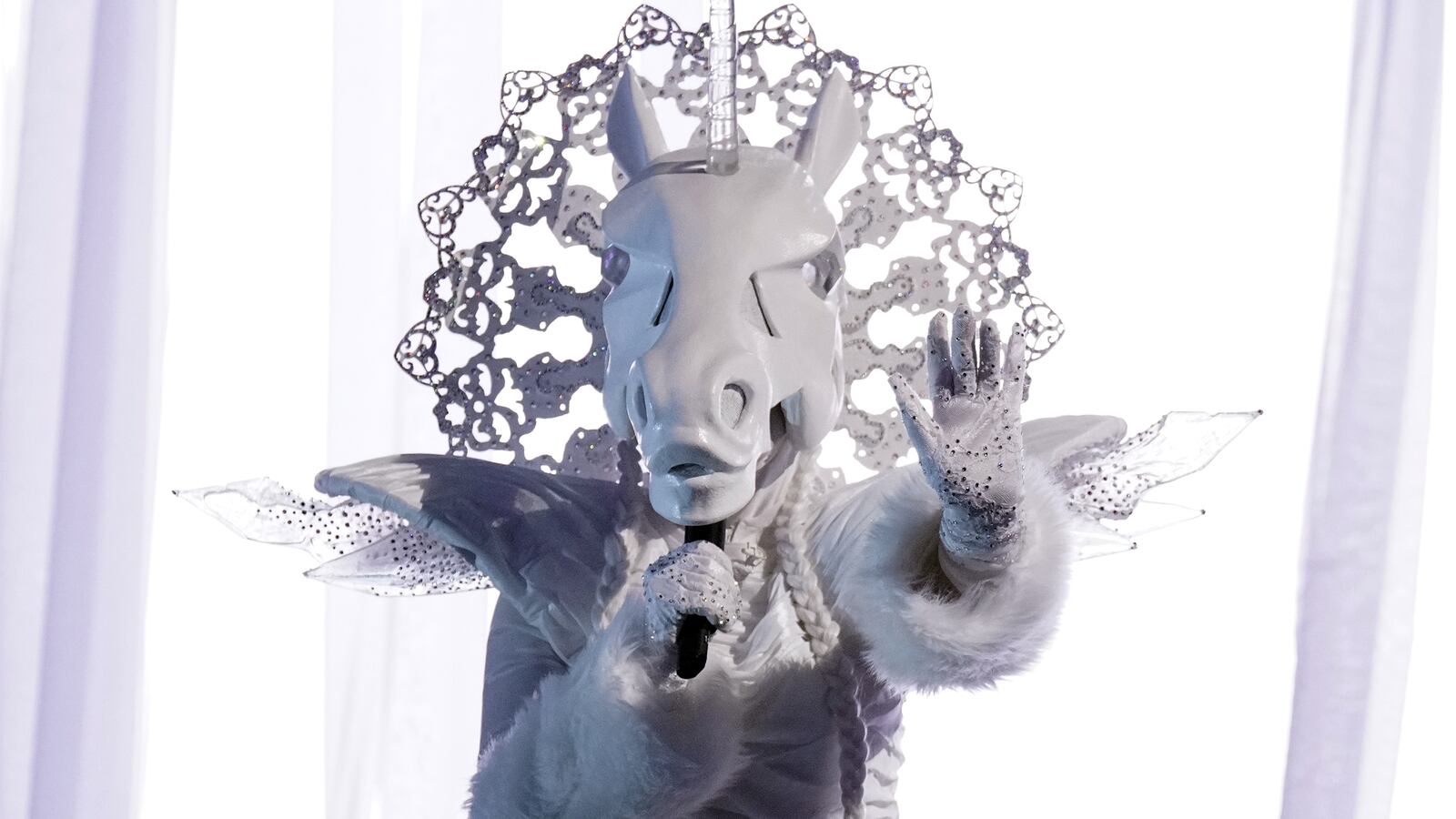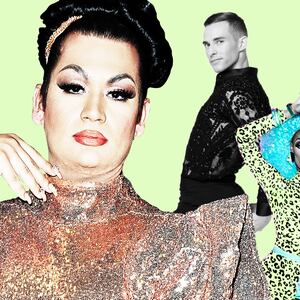With over 500 TV shows competing for audiences’ eyeballs, you gotta grab their attention somehow. The Masked Singer, if nothing else, certainly does that.
That much is clear by the end of the first episode, when the woman who very well may be a Kardashian belts out a pop song while in Christina Aguilera-in-“Lady Marmalade”-meets-The-Lion-King-on-Broadway drag—following a man in deer antlers singing through a gas mask snout (Steve Austin?) and a woman lilting in unicorn couture (Paris Hilton?) before her.
Lion, Deer, and Unicorn are but three of the secret celebrities dressed in deranged costumes performing for a panel of judges attempting to guess their identities. In what is being billed as a “Musical Whosungit,” each week, beginning with the hour that aired Wednesday night, one of the 12 celebrities will be unmasked and their true identities revealed.
(WARNING: Spoilers from Wednesday night’s episode follow.)
The show is all about that reveal, ostensibly stunning the audience when they learn that the man dressed as a hip-hop Hippo warbling through “My Prerogative” is actually Pittsburgh Steeler Antonio Brown.

Shocking? If you happened to know who this person is, I guess it might have been! If you are me, you screamed, “Who?” from your couch, sank back, and sighed.
But, sure. Brown can do an OK version of a Bobby Brown song while wearing a hippo mask. That’s it. That’s the show.
It all started as an admirably bizarre reality series that revelled in its unabashed spectacle and lunacy. But it became, somehow, a bit of a bore.
The Masked Singer is the self-proclaimed “wildest singing show” on TV, as host Nick Cannon reminds us incessantly with an increasingly rote boredom. But, once plucked of the fabulous plume of feathers on the mystery Peacock’s collar, the peculiarity of a Rabbit in a straitjacket tuxedo singing “La Vida Loca” (coming to you next week), and Jenny McCarthy mugging faux-stunned reactions through it all, it is as bloated, drawn out, and zapped of energy as the other singing competitions it is supposed to be eclipsing.
Sure, you may have just watched a grown man in a furry one-eyed monster costume croon “Don’t Stop Me Now” while background dancers in lycra bodysuits contort around him and former Pussycat Doll Nicole Scherzinger wonders if we’re watching Gucci Mane reveal a hidden talent. But it’s also a show with little—actually no—stakes. Believe it or not, the show needs to be even weirder.
The game is trying to figure out who the singers are, and that’s where the audience investment ends. We don’t vote for our favorite singer. There is no prize or record contract to bestow. The judges don’t critique performances or mentor contestants like on rival series. Instead they try to guess who these costumed performers are, choosing which one must be unmasked at the end of the episode.
To that end, the series lives and dies on making sure we recognize those faces when the masks are removed. Fox is touting that the 12 contestants have 65 Grammy nominations, 16 multi-Platinum albums, 16 Emmy nominations, nine Broadway shows, four stars on the Hollywood Walk of Fame and four Super Bowl titles among them.
That may be true, but over the two episodes I screened, I was at different times convinced that I was watching celebrities as varied as Donny Osmond, Peyton Manning, Tori Spelling, and Tina Turner sing.
All we have to go on now is that a NFL player was the Hippo. If the star power of these reveals is the lynchpin of this entire spectacle, then Brown makes the case that The Masked Singer is more likely to be less the next viral phenomenon than it will be a version of Dancing With the Stars with crazier costumes.
The Masked Singer, like so many major hits and cringe-inducing misses before it, is adapted from a hugely popular international series. In this case, it’s based on the South Korean format King of Mask Singer, a ratings blockbuster that spawned other spin-offs around the world.
The most famous reveal came when Ryan Reynolds made a surprise appearance on King of Masked Singer singing “Tomorrow” from Annie dressed as a unicorn during his promo tour for Deadpool 2. So far we have Brown performing a Bobby Brown hit.
Having seen the U.S. version of The Masked Singer now, it’s almost more interesting to learn about how the show pulled off keeping what producers still promise is “top-level talent” a secret from everyone.
NDAs (non-disclosure agreements) were everywhere for studio audiences and production members, of course. But beyond that, the performers had to meet drivers at second locations before being transported to set, with the chauffeurs not knowing who they were picking up. While walking around set, they were forced to wear cloaks that concealed all skin, including their hands, labeled “Don’t Talk to Me” so that the crew wouldn’t be tempted to identify them by their voices. If their manager or any family members with them were recognizable, they had to be shrouded in cloaks and masks, too. Anytime they spoke for the purpose of the telecast, their voice was altered though a voice changer.
One producer told The Hollywood Reporter that not even the show’s director knew the singers’ identities.
When the performers are introduced as their alter egos—Peacock, Hippo, Monster, Unicorn, Deer, and Lion in the premiere—a clip package plays in which they introduce themselves with extremely vague clues about who they are, which the judges riff from as they warble their songs.
Is the Peacock who started performing at age 5, used to be on posters that hung on your mom’s wall, and was friends with Michael Jackson actually Zac Efron? Jimmy Kimmel? Teller, from Penn & Teller? (I’m convinced it’s Donny Osmond.) Or is that belting Lion who says she comes from Hollywood royalty and that “in my pride, there are a lot of women” from a girl group? Or is she a Kardashian? (I think it’s Rumer Willis.)
If any of those questions sound interesting to you, and/or you like hearing Ken Jeong, Robin Thicke, Jenny McCarthy, and Nicole Scherzinger scream “I DON’T KNOW WHO THIS IS!” in constant rotation, then The Masked Singer may just be your new favorite show.
Still, there is something charming about the series, for all of its dressed-up banality.
It has no pretense of being anything more than spectacle and fun. It’s going to assault you with masks and costumes coming directly from your worst nightmares—or, depending on your kinks, wildest fantasies—have a little guessing game, and then end with a laugh about it all with whatever celebrities were willing to subject themselves to the exercise.
It’s a natural step in the evolution of the reality singing competition genre away from discovering amateur singers and towards spotlighting celebrity personalities in new ways. It’s been ages since a contestant from an American Idol or The Voice has become a bona fide superstar—or even just a singer whose name you’d remember—and those shows have pivoted toward banter and comedy between the big-name judges and coaches.
In the place of those competition series are the ever-popular Lip Sync Battle and Drop the Mic-type shows, which essentially serve as promo stops for the celebrities who choose to participate. We’re not sure what exactly the appeal or value would be for someone to agree to be on The Masked Singer, but the series is certainly a spiritual cousin of those shows.
With that in mind, the biggest gripe is that this weird spectacle isn’t weirder or more spectacular. If you’re going to give us odd then really go for broke with it. Brown dressed as a Hippo? No creepy animal mask can disguise that letdown.







